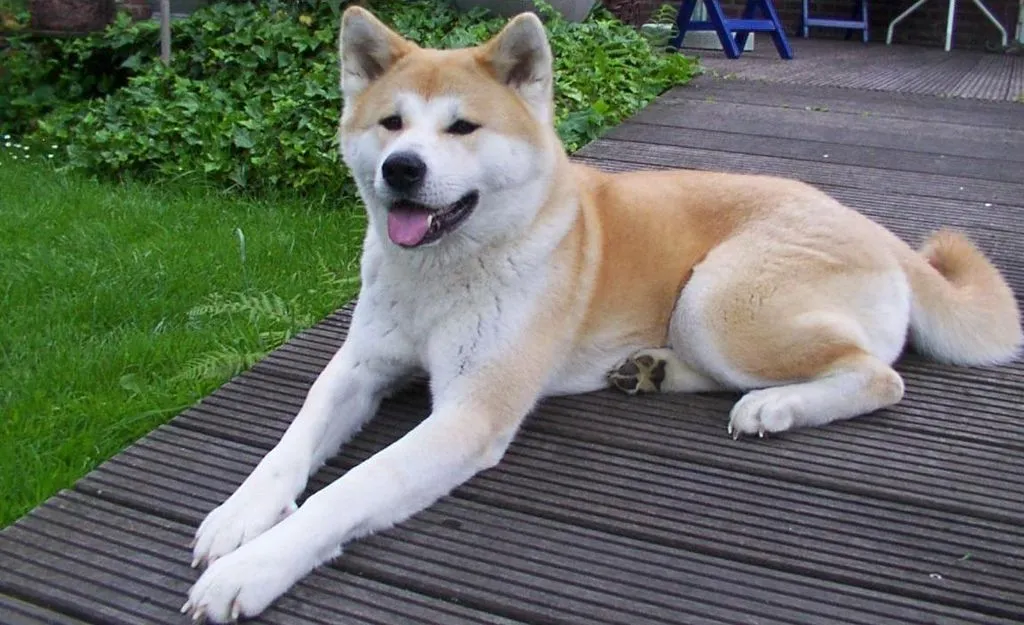All Pets
Directory
News & Stories
Shelters & Rescues
Home
/
Dog Breeds
/
Akita
Akita
Origin
Japan
Size
Large Breed
Ideal Space
House with backyard
Ideal Weather
10º-25ºC
Avg Monthly Expenses
₹5,700
Basic Lifestyle
₹8,550
Premium Lifestyle
Top 5 Traits
Intelligent
Loyal
Fearless
Protective
Disciplined



by Happy Pet Team
Introduction to the Akita Breed
Characteristics
Barking
Quiet
Loud
Temperament with Kids
Aggressive
Friendly
Playfulness
Silent
Very Playful
Friendliness
Not Friendly
Super Friendly
Compatibility with other dogs
Aggressive
Friendly
Need for attention
Independent
Very Needy
Monthly Expenses



Featured
Akita PUPPIES FOR YOU

Nutritional Care for Akita Dog
Monthly Food Expenses
₹ 3,000 - ₹ 4,500
Calories per day
Puppies: 2000 kcal
Adults: 1800 kcal
Essential Nutrients
Carbohydrates
Vitamins
Fibre
Protein
Fats
List of foods
Chicken
Home made meals
Dry Dog Food
Fresh Meat
Fresh Fish
Fruits
Vegetables
Breakdown of Macro-nutrients
Best Foods for Akita Dog
Foods to Avoid for Akitas
Avoid anything with these ingredients
Alcohol
Avocados
Cherries
Cinnamon
Coffee / Tea
Dairy
Fruit seeds
Garlic
Grapes
Onions
Salt
Sugar

Healthcare Tips for Akitas
Avg Monthly Expenses
₹ 1,500 - ₹ 2,250
Common Health Issues
Bloat
Hip Dysplasia
Canine distemper
Heartworm
Parasites
Parvovirus
Well being
Exercise
Bonding
Games
Socialization
Hiking
Energy Level
High
Exercise routine
60 - 120 minutes
Recognising Stress
Changes in appetite
Excessive Barking
Pacing
Excessive Panting
Reluctance to move
Common Health Issues in Akitas
Vaccination details
Growth Stage
Core Vaccines
6 - 8 weeks
DHLPP (Distemper, Hepatitis, Leptospirosis, Parvo, Parainfluenza)
12 - 14 weeks
Rabies
16 - 18 weeks
DHLPP
20-22 weeks
Bordetella
1 year
Rabies
Senior Dog Care for Akitas

Grooming Tips for Akitas
Avg Monthly Expenses
₹ 1,200 - ₹ 1,800
Shedding Level
High Shedding
Hygienic Checklist
Bathing
Eye Care
Ear Cleaning
Teeth Care
Nail Trimming
Brushing
Benefits of Grooming
Low Shedding
Cleanliness
Prevents infections
Prevents Bad Breath
Odourless
Quality of life

How Much Does an Akita Cost?
Cost of buying
₹ 30,000 - ₹ 1,50,000
Prerequisites to pet a Akita
Access to Groomer
Appropriate Climate
Access to Veterinary
Lifestyle Compatibility
Space and Environment
Financial Capability
Akita breeders in India
Shop or Adopt an Akita: Choice is Yours!
Written by
Happy Pet Team
Author
Team Happy Pet is a passionate collective of pet experts, enthusiasts, and advocates dedicated to sharing trusted and insightful content. Our contributors include experienced pet parents, dedicated fosters, stray dog community workers, seasoned vets, aquarists specializing in aquatic pet care, and bird caretakers who nurture and cultivate avian well-being. We also collaborate with Subject Matter Experts (SMEs) in pet nutrition, behavior, exercise, and training to provide well-researched, practical guidance for pet owners. From cat lovers and dog trainers to bird enthusiasts and aquarium specialists, our diverse expertise helps every pet thrive. Whether you're looking for expert guidance or just a dose of pet-loving joy, Team Happy Pet is your go-to source for all things pets!
Compare with similar breeds
Frequently Asked Questions
What is the temperament of an Akita?
Akitas are loyal, courageous and dignified in personality. They form bonds with their families and can be loving, but are cagey around strangers. They also have a naturally protective nature, and it makes them good watchdogs. But Akitas are independent thinkers, so early socialization, as well as firm, consistent training, is necessary. Playful and goofy with their loved ones but are generally indifferent to other animals or small children who don’t respect boundaries.
How much grooming do Akitas need?
Akitas have a thick double coat that needs to be groomed regularly. They shed year-round with heavy shedding twice a year with seasonal coat changes. Brushing 2-3 times a week is usually enough, but brushing daily is advised during shedding seasons. Like cats, Akitas self-groom, but they still do need occasional baths and nail trims to stay clean and healthy.
What are the common health concerns for Akitas?
Akitas are at risk for hip dysplasia, eye problems and thyroid disorders. Other concerns include autoimmune diseases, progressive retinal atrophy (PRA), and bloat. Genetic screening from reputable breeders and regular vet checkups can help reduce these problems.
How much exercise does an Akita need?
Akitas are active, requiring moderate to high levels of exercise. They require at least two hours of physical activity a day, which may be as simple as long walks, jogging, or mental stimulation like training. Indoors they remain calm, yet have high stamina and enjoy engaging in outdoor activities.
Stay updated with the pet industry
Subscribe Now
Download our pet-parent app
© Excitado Innovations Pvt Ltd






















